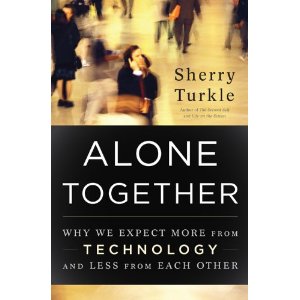Tomorrow night on the HR Happy Hour show we will be joined by MIT Professor Sherry Turkle, author of the recent book 'Alone Together: Why We Expect More from Technology and Less from Each Other'.
'Alone Together' is almost two separate, but linked works. Today, I will take a look at the first half of the book called 'The Robotic Moment: In Solitude, New Intimacies', which explores the world of 'social robots'; creations as simple as LED-powered children's Tamagotchi pets, to much more complex robots developed in the MIT Labs and other places, that ostensibly are the pre-cursors to the next (or next-next) generation of robots that will care for children, the elderly, and even provide companionship of a sort for really anyone.
Professor Turkle explores not so much the technical capabilities of the increasingly complex robots, but rather our relationship with them. The 'Robotic Moment' has nothing at all to do with feats like IBM's Watson playing (and at the moment), defeating human competitors at Jeopardy!; instead is has everything to do with our willingness to accept and perhaps compete for the attention of and connection to these social robots.
Professor Turkle describes studies conducted at MIT with advanced social robots named Cog and Kismet; robots that were capable of engaging in simple conversation, that would respond to verbal and non-verbal cues, and perhaps most importantly would seek out people in the room, make eye contact, and demonstrate what to many of the study participants felt like 'caring' behaviors. And that, is the key, the Robotic Moment. When we think robots can move beyond simply performing according to their programming, and acting in caring and nurturing ways.
But we are misguided in these beliefs. Even the most advances, lifelike, and realistic social robots can't truly 'care' about us. But as Professor Turkle details in the book, that may still be acceptable for many. She recounts numerous stories from her research of Grandmothers ignoring their grandchildren to attend to a robot 'Real Baby's' needs, elderly nursing home residents accepting robot baby seal-like creatures as companions, and even the developers and programmers of the most advanced robots seemingly conflicted about the true nature of their creations.
A book about robots, and the wonderful things they can do, is not really all that interesting, pehaps only from an engineering perspective. But an examination of what the increasing development and more complex and nuanced relationships that we have with these social robots, and what it might suggest about ourselves is fascinating.
Do we want to develop better and more capable social robots as babysitters or elder care companions simply because those are the kinds of jobs that we no longer value highly enough to staff with people? And do children and the elderly seem willing to accept these robots, while (mostly) aware of their shortcomings as 'good enough' substitutes for parents and adult children that are often too burdened, too busy, and too distracted to devote the time and attention needed?
And if (or perhaps when), robots do become more a part of our cycle of life - as babysitters, assistants, emotional companions, and elder care givers, what does that say about us, and about our conception and definition of emotional connection? When robots make the progression from 'Better than nothing', insofar as they serve as stand-ins for roles that people no longer can or want to perform; to 'Better than Anything', preferred over humans as companions and care givers, then the Professor argues we are on the precipice of a dramatic slide. The robots are smart, they 'know' that we want to nurture them, and that we come to love the things we nurture, and nurture the things we love.
But can we really 'love' a robot?
Tomorrow, I will take a look at the second half of 'Alone Together', called Networked: In Intimacy, New Solitudes', which focuses on the always on, always connected world of social networks and virtual worlds.
What is the connection between robots and social networks? Think it is sort of crazy to think you could ever love a robot?
How do you feel about your smartphone?

 Steve
Steve


